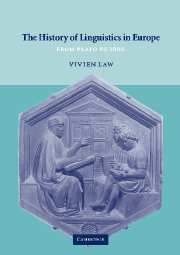Book contents
- Frontmatter
- Dedication
- Contents
- List of illustrations
- List of maps
- List of boxes
- Preface
- 1 Getting ready to study the history of linguistics
- 2 Greek philosophy and the origins of western linguistics
- 3 Towards a discipline of grammar: the transition from philosophy
- 4 From literacy to grammar: describing language structure in the ancient world
- 5 Christianity and language
- 6 The early Middle Ages
- 7 The Carolingian Renaissance
- 8 Scholasticism: linking language and reality
- 9 Medieval vernacular grammars
- 10 The Renaissance: discovery of the outer world
- 11 A brief overview of linguistics since 1600
- 12 Becoming a historian of linguistics
- Research resources in the history of linguistics
- Notes
- Index
5 - Christianity and language
Published online by Cambridge University Press: 05 March 2015
- Frontmatter
- Dedication
- Contents
- List of illustrations
- List of maps
- List of boxes
- Preface
- 1 Getting ready to study the history of linguistics
- 2 Greek philosophy and the origins of western linguistics
- 3 Towards a discipline of grammar: the transition from philosophy
- 4 From literacy to grammar: describing language structure in the ancient world
- 5 Christianity and language
- 6 The early Middle Ages
- 7 The Carolingian Renaissance
- 8 Scholasticism: linking language and reality
- 9 Medieval vernacular grammars
- 10 The Renaissance: discovery of the outer world
- 11 A brief overview of linguistics since 1600
- 12 Becoming a historian of linguistics
- Research resources in the history of linguistics
- Notes
- Index
Summary
The arrival of Christianity
With Christianity a completely new force burst upon the spiritual and intellectual life of Europe. No area of intellectual endeavour was unchanged, least of all linguistics. The language policy and transformed educational priorities of the Church, and the far-reaching programmes of education undertaken in regions previously untouched by Greco-Roman civilisation, created new external conditions for language study, while the few enigmatic mentions of language in the Bible spurred the best minds of the age to take up the challenge of reconciling new ideas with old. The centuries from late Antiquity to the central Middle Ages, from approximately 400 to 1200, are characterised by the permeation of traditional Greco-Roman ideas about language with Christian attitudes – a ‘conversion’, so to speak, of linguistics to Christianity.
Why was Christianity so important? Religion is peripheral to most people's lives in the West today, but in terms of world history, we are the odd ones out. Up until the Renaissance, people all round the world were aware of the existence of a spiritual world and took religious observances very seriously. On the wane for centuries, this awareness disappeared in Europe around the time of the Renaissance, replaced for almost everyone by tradition, and has been fading away in other parts of the world too. A second factor which gave Christianity and the Christian Church a far greater importance than they possess today was the collapse of the institutional structures of the Roman empire under the pressure of successive waves of Germanic peoples.
- Type
- Chapter
- Information
- The History of Linguistics in EuropeFrom Plato to 1600, pp. 94 - 111Publisher: Cambridge University PressPrint publication year: 2003

